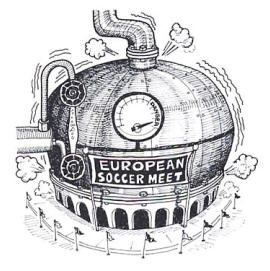The tragic violence that left nearly forty dead at last spring's European Cup soccer final in Brussels stands to remind us of the powerful control material nature exerts over us. In the fourteenth chapter of the Bhagavad-gita, Lord Krsna describes how material nature's three features, or modes (goodness, passion, and ignorance), bind and control us.

Highest is the mode of goodness (sattva-guna). Its characteristics are knowledge, peacefulness, purity, and freedom from material desire. Next is the mode of passion (rajo-guna), which exhibits the characteristics of attachment, uncontrollable desire, hankering, and intense endeavor for prosperity and sense gratification. And last is the mode of ignorance (tamo-guna), characterized by madness, indolence, and sleep. This mode is very dangerous, because it can rob us of the ability to discriminate or to comprehend the results of our actions.
Considering all this, it becomes obvious that the Liverpool and Juventus supporters had not come to the Heizelstadium to celebrate the mode of goodness. No! Passion ruled the day.
The fans had traveled a long way and had paid a lot of money. They wanted their team to win. They felt powerful in their numbers. The rival team and its supporters were the enemy. The enemy had to be defeated.
Now, the mode of passion is not always bad. After all, men influenced by this mode have built beautiful cities and have made many wonderful discoveries and inventions. They have produced masterpieces of art and music and have done so many great things. But the mode of passion does tend to be unstable. It could be compared to a high-pressure boiler. As long as certain control valves are working properly, the expansive heat and pressure can be contained and directed toward useful work. But if the control system breaks down, the result can be explosive. Similarly, unchecked passion is a frightening thing. The mode of passion, therefore, should always be kept under the control of a higher mode.
For example, in the ideal Vedic society, the kings, soldiers, and other passionate men were always submissive to the instructions of the brahmanas,who were situated in the mode of goodness. Since the brahmanas were endowed with foresight, forbearance, and transcendental knowledge, they could counterbalance the impulsiveness and passion of the martial class. Thus they guided the ambitious rulers of society to channel their passionate natures for the good of everyone.
But when the mode of passion is allowed to fall under the influence of the mode of ignorance, the result is always disastrous. Consider again the scene at that soccer match.
What happened? Simple. Tamo-guna, the mode of ignorance, descended on the crowd. Since uncontrolled passion is intense, aggressive, and full of attachment, it can easily develop into its most volatile form: anger. A spark of the mode of ignorance can then touch off an explosion, for this lowest mode is characterized by irrationality and madness. Under the influence of the mode of ignorance, one scarcely knows or cares what he or she is doing.
Many of the spectators at the game had been drinking. And of all the routes into the dark depths of ignorance, intoxication is perhaps the quickest and easiest. Passion thus turned into fury, and many ordinary people began behaving like madmen. Deadly missiles were hurled. Iron railings were torn down and used as clubs. One "spectator" was even photographed firing a pistol into the crowd.
If the mode of passion mixed with the mode of ignorance can create such mindless violence over a simple soccer match, imagine the kind of violence people are capable of over larger issues.
The nations of the world are now armed to the teeth, and matters far more serious than a European Cup final are at stake. Unless people learn how to avoid the lower modes of nature, especially the mode of ignorance, we will surely have disaster on a scale that we can now scarcely imagine.
The magnitude of the task of educating and elevating human society is obviously enormous, but the means are within our grasp. The main footholds of the mode of ignorance intoxication, animal killing, perversion, indolence, and so on have to be eradicated. And at the same time, the principles of goodness such as sense control, cleanliness, and truthfulness should be promoted. Human beings must understand that the aim of their lives is to become Krsna conscious and go back to Godhead.
For a society to become free from the degrading and dangerous influences of passion and ignorance is definitely not easy. But the Bhagavad-gita and themaha-mantra (Hare Krsna, Hare Krsna, Krsna Krsna, Hare Hare/ Hare Rama, Hare Rama, Rama Rama, Hare Hare) are there to help us. We must shake free of the degrading influence of the lower modes of nature and give spiritual realization a chance.
